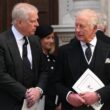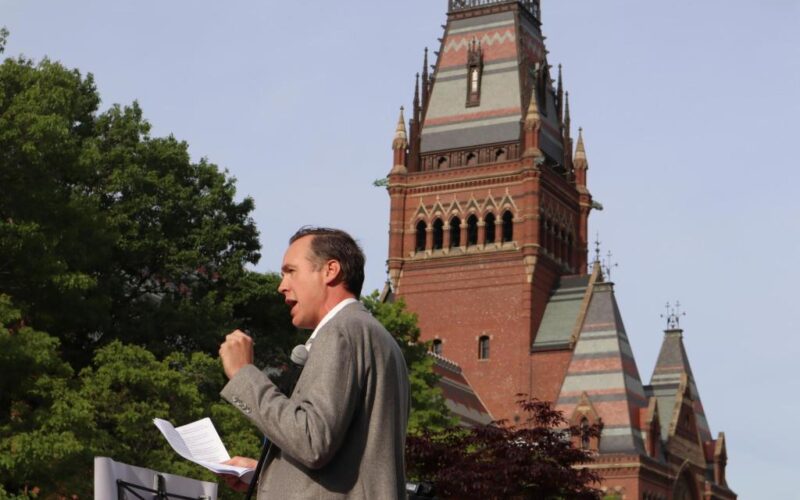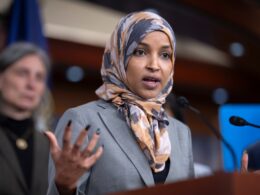By MICHAEL CASEY, Associated Press
BOSTON (AP) — Harvard University appeared in federal court Monday in a pivotal case in its battle with the Trump administration, as the storied institution argued the government illegally cut $2.6 billion in federal funding.
President Donald Trump’s administration has battered the nation’s oldest and wealthiest university with sanctions for months as it presses a series of demands on the Ivy League school, which it decries as a hotbed of liberalism and antisemitism.
Harvard has resisted, and the lawsuit over the cuts to its research grants represents the primary challenge to the administration in a standoff that is being widely watched across higher education and beyond.
A lawyer for Harvard, Steven Lehotsky, said at Monday’s hearing the case is about the government trying to control the “inner workings” of Harvard. The funding cuts, if not reversed, could lead to the loss of research, damaged careers and the closing of labs, he said.
The case is before U.S. District Judge Allison Burroughs, who is presiding over lawsuits brought by Harvard against the administration’s efforts to keep it from hosting international students. In that case, she temporarily blocked the administration’s efforts.
At Monday’s hearing Harvard is asking her to reverse a series of funding freezes. Such a ruling, if it stands, would revive Harvard’s sprawling scientific and medical research operation and hundreds of projects that lost federal money.
A lawyer for the government, Michael Velchik, said the government has authority to cancel research grants when an institution is out of compliance with the president’s directives. He said episodes at Harvard violated Trump’s order combating antisemitism.
Judge questions basis for government’s findings on antisemitism
Burroughs pushed back, questioning how the government could make “ad-hoc” decisions to cancel grants and do so across Harvard without offering evidence that any of the research is antisemitic.
She also argued the government had provided “no documentation, no procedure” to “suss out” whether Harvard administrators “have taken enough steps or haven’t” to combat antisemitism.
“The consequences of that in terms of constitutional law are staggering,” she said during Monday’s hearing. “I don’t think you can justify a contract action based on impermissible suppression of speech. Where do I have that wrong.”
Velchik said the case comes down to the government’s choosing how best to spend billions of dollars in research funding.
“Harvard claims the government is anti-Harvard. I reject that,” Velchik said. “The government is pro-Jewish students at Harvard. The government is pro-Jewish faculty at Harvard.”
Harvard’s lawsuit accuses the Trump administration of waging a retaliation campaign against the university after it rejected a series of demands in an April 11 letter from a federal antisemitism task force. A second lawsuit over the cuts filed by the American Association of University Professors and its Harvard faculty chapter has been consolidated with the university’s.
The April letter demanded sweeping changes related to campus protests, academics and admissions. For example, the letter told Harvard to audit the viewpoints of students and faculty and admit more students or hire new professors if the campus was found to lack diverse points of view.
Harvard President Alan Garber has said the university has made changes to combat antisemitism but said no government “should dictate what private universities can teach, whom they can admit and hire, and which areas of study and inquiry they can pursue.”
Monday’s hearing ended without Burroughs issuing a ruling from the bench. A ruling is expected later in writing.
Trump’s pressure campaign has involved a series of sanctions
The same day Harvard rejected the government’s demands, Trump officials moved to freeze $2.2 billion in research grants. Education Secretary Linda McMahon declared in May that Harvard would no longer be eligible for new grants, and weeks later the administration began canceling contracts with Harvard.
As Harvard fought the funding freeze in court, individual agencies began sending letters announcing the frozen research grants were being terminated. They cited a clause that allows grants to be scrapped if they no longer align with government policies.
Harvard, which has the nation’s largest endowment at $53 billion, has moved to self-fund some of its research, but warned it can’t absorb the full cost of the federal cuts.
In court filings, the school said the government “fails to explain how the termination of funding for research to treat cancer, support veterans, and improve national security addresses antisemitism.”
The Trump administration denies the cuts were made in retaliation, saying the grants were under review even before the April demand letter was sent. It argues the government has wide discretion to cancel contracts for policy reasons.
The research funding is only one front in Harvard’s fight with the federal government. The Trump administration also has sought to prevent the school from hosting foreign students, and Trump has threatened to revoke Harvard’s tax-exempt status.
Finally, last month, the Trump administration formally issued a finding that the school tolerated antisemitism — a step that eventually could jeopardize all of Harvard’s federal funding, including federal student loans or grants. The penalty is typically referred to as a “death sentence.”








